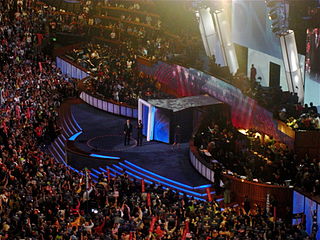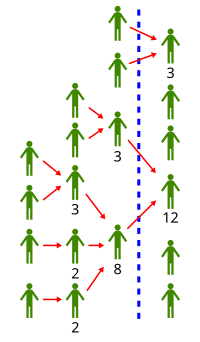 Do you understand why we nominate presidents the way we do? As we get into the nominating contest, and the Democratic and Republican Parties decrease in popularity (helped along by a bad economy and their own hostile natures), more and more people across the political spectrum advocate for the end of the party system. Most recently, Patrick Laverty of Anchor Rising has advocated for it. It seems a simple enough reform; but I think it’s a short-sighted one. For one thing, it ignores the historical realities that led to state regulation of parties.
Do you understand why we nominate presidents the way we do? As we get into the nominating contest, and the Democratic and Republican Parties decrease in popularity (helped along by a bad economy and their own hostile natures), more and more people across the political spectrum advocate for the end of the party system. Most recently, Patrick Laverty of Anchor Rising has advocated for it. It seems a simple enough reform; but I think it’s a short-sighted one. For one thing, it ignores the historical realities that led to state regulation of parties.
For those without the time to read, I’ll give a quick summation; essentially when the nominating process began utilizing a convention system (it took to around 1832 for parties to start utilizing it, prior to that, a party’s legislative caucus in a state nominated candidates) lawlessness in the process was pretty common. This is how you got political bosses who controlled machines. Since parties were more or less voluntary associations in the eyes of government, there was no need to regulate how they selected candidates. Most changes in the nominating process for president tended to be reforms of previous systems, and vary from state to state, creating a piecemeal system which still exists in the Republican Party today (Democrats overhauled their system in the 1970s and asserted national party control).
Now, Mr. Laverty strikes towards the abolition of political parties ignoring that politicians will tend to associate in factions. The same error was made by the Framers of the Constitution, which is why we got the Twelfth Amendment (reorganizing the Electoral College process) in the first place. Politics requires parties, if only to keep political alliances out in the open. Even officially non-partisan states like Nebraska have politicians who are of parties. Party-line votes still exist, and the parties endorse candidates. A non-partisan primary system is really just a first-round election in a run-off system. Simply put, there is no feasible way to organize a political system without parties; world views will always align with similar world views.
Though I’ve just laid out the issues of not having state control of the primary system, I do think there are some inherent issues in it. For one thing, the state can be a slow mover (witness our 1950s social programs grafted onto our Gilded Age economy). The second thing is that the state is much like corporations; both resist experimentation and new ideas (despite our “lively experiment” rhetoric). Having hit upon a successful formula, we cling to it. Government is thus almost always reactionary. You need only see how we respond to crises once they happen, instead of investing in prevention. Y2K, largely a punch line now, was prevented due to our prevention measures; systems did go down. But when the end of the world didn’t happen, we laughed it off. This inability to respond to future crises limits the scope of the debate when it comes to things like climate change. And it limits our ability to experiment in government. If things are working, why change?
An inherently conservative mindset, and one that I actually think must be asked. But if we take the view that there’s too much money politics, or that the elite few are foisting their views on the popular many, or whether special interests have too much power; then we can certainly says that things are due for a change. Both the Tea Party and Occupy Wall Street hit upon this view (“things need to change”) though their prescriptions are very far apart.
But no matter how you frame it, the call for greater democratic control is a very noble one. We do exist in a representative democracy, but this has always been fraught with trouble. For much of our early history, this meant only the well-off could vote or hold office (leading to the outbreak of the Dorr Rebellion). For the majority of our history, this meant black people couldn’t vote. Our representatives have always represented people they were never beholden to. This continues to this day.
That said, representative democracy does have its upsides. It is genuinely fine for people to have other concerns than politics. We don’t all need to be involved in government. Under the current system, you look to your politicians and essentially say, “I’m ceding my autonomy to you, so you can do the deciding for me, so I can get on with my life. But I reserve the right to yell at you if you do something I don’t like, and I reserve the right to throw you out next election.” The issue is that this then creates a system where the preferences of the politician are largely dominant to those of the voters.

So how do we found a new process that forces greater democratic control without hindering the ability of representatives to get their jobs done? That’s a question I can’t quite answer, but I will say one system is to actually control the platform. I pay attention to world politics a bit, and one of the things that interested me was the development of the idea of liquid democracy by the German Pirate Party utilizing LiquidFeedback.
Essentially, party platform can be suggested by anyone, with a proposal submitted to a central website. Members are free to discuss this system for a set period of time, and then a final draft is submitted and proposal is voted upon. But say a proposal comes up which you don’t really care or just can’t comprehend? In this case you can cast your vote yourself, or you can delegate your vote to another person; you can do this on an issue-by-issue basis or on a topic-by-topic basis. So if I know nothing about environmental policy, but my friend Jay does, I simply allow Jay to cast my vote for me. Jay might not fully grasp all aspects of environmental policy, and on certain issues might delegate to someone else. In this case, my vote would travel with Jay’s to this third person, who could then cast three votes.
There are serious drawbacks to this system. Issues like fraud, buying votes, and hacking are top concerns, along with the fact that not everyone has access to electronics or the Internet. But it’s intriguing as a system that essentially lowers the bar to participation, keeps politics relatively local, and allows a great amount of representation. Candidates could easily be nominated and selected using this system, instead of the complicated delegate rules that currently dominate the political parties.
But this is just one idea. Since I’ve gone on for a long time, how would you change things? What’s your ideal change in terms of politics or government or elections? How would you implement it?


Deprecated: Function get_magic_quotes_gpc() is deprecated in /hermes/bosnacweb08/bosnacweb08bf/b1577/ipg.rifuturecom/RIFutureNew/wp-includes/formatting.php on line 4387
Deprecated: Function get_magic_quotes_gpc() is deprecated in /hermes/bosnacweb08/bosnacweb08bf/b1577/ipg.rifuturecom/RIFutureNew/wp-includes/formatting.php on line 4387
Deprecated: Function get_magic_quotes_gpc() is deprecated in /hermes/bosnacweb08/bosnacweb08bf/b1577/ipg.rifuturecom/RIFutureNew/wp-includes/formatting.php on line 4387